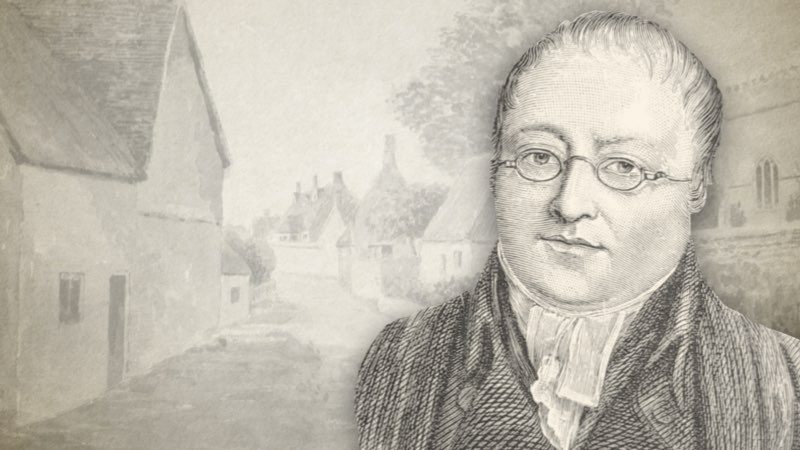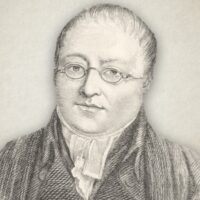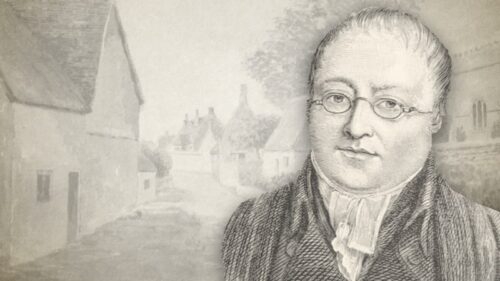
The Life And Ministry Of Legh Richmond
The Sower 1896:
Legh Richmond was born at Liverpool, on January 29, 1772, where his father, Dr. Henry Richmond, practised as a physician; his mother was an estimable woman, of superior mind and acquirements. To the extent of her religious knowledge, she taught him, and she especially encouraged him in reading the Scriptures. Thus was laid the foundation of those clear views of Divine truth which afterwards distinguished him as a minister of Christ. In consequence of an accident in his childhood, which occasioned permanent lameness, he received the rudiments of a classical education from his father. He was entered at Trinity College, Cambridge, when seventeen years of age. His father had designed him for the legal profession, but his own mind was rather inclined to the Church. Consequently he was ordained in the month of June, 1797, to the curacy of Brading and Yaverland, in the Isle of Wight. His marriage with Mary, only daughter of James William Chambers, Esq., of Bath, took place shortly after. By performing his duties in a conscientious manner, he soon acquired the character of a respectable and useful young clergyman. A few months, however, after his residence at Brading, a great change took place in his views and feelings. His own words will best explain the means, &c., by which this took place. He remarks: “I feel it to be a debt of gratitude which I owe to God and man, to take this affecting opportunity of stating that to the unsought and unexpected introduction to Mr. Wilberforce’s book on ‘Practical Christianity’ I owe, through God’s mercy, the first sacred impression which I ever received as to the spiritual nature of the Gospel system, the vital character of personal religion, the corruption of the human heart, and the way of salvation by Jesus Christ. As a young minister recently ordained, and just entrusted with the charge of two parishes, I had commenced my labours too much in the spirit of the world, and founded my public instructions on the erroneous notions which prevailed amongst my academical and literary associates. The Scriptural principles stated in the ‘Practical View’ convinced me of my error—led me to the study of the Scriptures with an earnestness to which I had hitherto been a stranger—humbled my heart, and brought me to seek the love and blessing of the Saviour who alone can afford a peace which the world cannot give.”
The change thus wrought in Mr. Richmond had a great effect on his ministry. He became now a faithful teacher of the Gospel in all its simplicity and fulness. His labours were greatly blessed, and numerous converts were the seals of his ministry. Among the first-fruits of his ministry were those characters whose life and experience form the work, “Annals of the Poor,” comprising the “Dairyman’s Daughter,” “The Young Cottager,” &c., which, from the simplicity and genuineness of their testimony to the grace of God, are scarcely to be equalled, and are known to this day in almost every household. Their circulation has long ago reached many millions, and the Spirit of God has owned them for much good to very many.
Soon after the great change took place in his mind, a grocer in Newport sent him some trifling article wrapped up in a leaf of Bishop Jewell’s “Apology.” His attention being directed to the leaf by his family, he read it, and immediately set off for Newport to enquire for the remaining pages. The grocer smiling at the anxiety of his customer, replied, “Oh yes, sir, here they are, and I have a whole hogshead of these worthies; they are much at your service for twopence a pound.” The purchase was speedily effected, and to this circumstance—trifling as it may appear—Mr. Richmond owed his extensive knowledge of the writings of the reformers, from which he edited selections amounting to eight volumes. As a preacher he excelled, and was greatly blessed. Scriptural, experimental, practical, full of pathos and interest, he was listened to by crowded congregations wherever he went. He had, moreover, a remarkable simplicity of language, and a lively poetical imagination; but, more than all, he spoke what he knew and felt.
In the year 1805 he accepted a proposal to assist the Rev. Thomas Fry in his laborious duties as chaplain to the Lock Hospital. Here he stayed but a few months, being appointed, through the recommendation of the excellent Ambrose Serle, to the rectory of Turvey, Bedfordshire. Entering upon his new duties, he established an evening lecture, a cottage lecture among the poor, a weekly service in the workhouse, and, besides his public preaching, he was a constant visitor at the cottages of the poor, seeing to their temporal as well as spiritual needs. His first service amongst the Sunday School children was followed by the conversion of two of them. After the services of the Sabbath were over, it was his practice to meet those who had been newly awakened to spiritual life, with a view to their special direction and encouragement; and, as further showing the spiritual reality of his work, it may be added that his communicants, whom he received with the greatest caution, were for the most part the fruits of his ministry.
The following instance in which God made him a blessing deserves special mention. In the parish of Biddenham, about six miles from Turvey, lived an amiable and conscientious clergyman, whose views of divine truth on his first entrance into the ministry were, aa in the case of Mr. Richmond, by no means clear. Not long after his ordination he became anxious and dissatisfied, and he was thereby led to an earnest inquiry into the nature of the Gospel scheme. For two years his mind was kept in a state of painful conflict. At length, through the perusal of Romaine’s ”Discourse on the Law and Gospel,” and Richmond’s Extracts from the Old Divines, his mind was established in the truth, and he sought Mr. Richmond’s acquaintance, and invited him to preach for him at Biddenham. The impression produced by the sermon must be stated in his friend’s own words: ”It was the first time,” said he, “that I had ever heard a minister of his sentiments. The impressive manner in which he unfolded the great truths of the Gospel, the earnest and affectionate appeals he made to the conscience, &c., awakened in me a train of solemn reflections, and especially on the value of public preaching, when accompanied with such holy and devout affections. An intense interest and a heavenly fervour seemed to be depicted in every countenance and to be felt in every heart. I shared in the same emotions, but they were accompanied by a great depression of feeling, and a conviction that I was wholly unworthy to enter the same pulpit. Nor shall I ever forget the seasonable remark of a pious old man on the following morning, who, in dwelling on the excellencies of the preceding day’s discourse, observed, ‘The grace that God has given to him He can give to both you and me, for God is no respecter of persons.'” This clergyman was the Rev. T. Grimshawe.
The death, in 1825, of two of his sons, of great promise, was a great trial and sore affliction to him. For a while he shut himself up in the solitude of his study, and continued in silent communion with God. But at length he came forth, testifying to the power of God in sustaining and comforting his soul. He resumed his ministerial work with increased zeal until his last illness in 1827. The last sermons he preached were in the beginning of March, 1827. The text the first Sunday was Psalm 51:10: “Create in me a clean heart, O God, and renew a right spirit within me,” which was carried home with power to one who had been a great persecutor, and led to his repentance. The next Sunday his sermons were very solemn, from Colossians 3:2, and Psalm 119:52, 53. This last sermon was a very solemn appeal to unawakened sinners. It was remarked by one going out of the church, “This sounds as if it came from the lips of a dying man.’’
We should have expected, after such a life spent in the Redeemer’s service, a triumphant death, but otherwise it was one of peace, although Satan was several times permitted to harass him as to his standing in Christ. When his old friend, Rev. T. Fry, called on him, and thought it necessary to remind him of his nearness to eternity, his reply was, “I know it, brother; seven months ago I was well satisfied from whence this cough came, that it was a messenger from above. I knew what it meant.” On Mr. Fry resuming the conversation, he told him how Satan had been trying him, but said, “I cast myself on the sovereign free and full grace of God in the Covenant by Christ Jesus, and there, brother (looking at him with a smile of tranquillity quite indescribable, and which he should never forget), there I have found peace.” He was very anxious that one who proclaimed the same truths of sovereign grace and love of God to lost sinners should supply his place, proving that he felt his end to be near. He never kept his bed, but rose every day to the last, only rising a little later and going to bed earlier. The last two weeks he was very silent, and appeared constantly in prayer and meditation, waiting his dismissal and the end of his earthly pilgrimage. Two days before his death he received a letter mentioning the conversion of two persons (one a clergyman) through reading the “Dairy man’s Daughter,” and exclaimed, ”How unworthy of such honour!” The last night he was carried upstairs by his son Henry, and about ten o’clock, in the gentlest whisper, asked all to be sent away and the curtains drawn round him, and about half-past ten he peacefully breathed his last. A few days afterwards he was buried in the same vault in Turvey Churchyard with his two sons, great numbers from far and near being present, his two most attached friends, Grimshaw and Fry, conducting the funeral services.
His services on behalf of the Jews, the Church Missionary Society, and the Bible Society, were most successful, large sums being collected. After a sermon on behalf of the Church Missionary Society, at St. Bride’s, Fleet Street, in 1809, the collection amounted to £331 ls., and equally large sums for several years in his annual tours were the result. His memory is fragrant, and his works do follow him.
Legh Richmond (1772-1827) was an Anglican High-Calvinist preacher and writer. He served for twenty-two years as Rector of Turvey, Bedfordshire.




